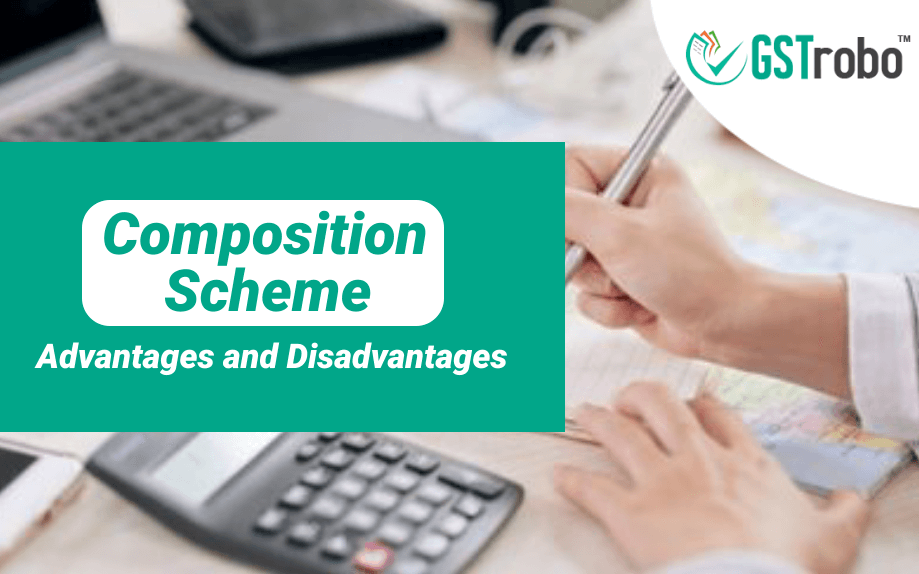Composition Scheme – Advantages and Disadvantages
The GST has not only helped large enterprises to grow and expand but also had some major schemes for small enterprises. One such scheme is the Composition Scheme which was introduced under GST to relax the tax compliance of small enterprises. But as we know that every advantage has a disadvantage. So, in this blog, we will try to cover all the advantages and disadvantages related to Composition Scheme under GST.

About Composition Scheme under GST
A composition Scheme under GST was introduced with the motive to help the small enterprises to comply with the GST provisions and relax the tax levied on them. So, keeping this in mind, the GST return filing frequency was changed to quarterly instead of monthly under the Composition Scheme for the taxpayers whose aggregate turnover during a financial year is less than INR 1.5 Crores. Moreover, every composition scheme holder can pay GST on the goods or/and services at the flat GST rate.
Tax Rate Applicable under GST Composition Scheme
Once a taxpayer registers for the composition scheme under GST, a flat GST rate applies to all the goods or/and services that he/she supplies or renders. The current tax rate applicable under the GST composition scheme are:
- 1% GST rate is applicable in the case of goods manufacturers and traders.
- In the case of restaurants (not serving alcohol), a flat 5% GST is applicable.
- In the case of service providers 6% GST rate is applicable.
Limit of Composition Scheme under GST
The limit of composition scheme under GST depends on the type of business:
- Manufacturers and Traders
In the case of a newly registered business, the turnover during the current fiscal year shall not exceed INR 1.5 crores.
In the case of a registered business, the turnover during the previous fiscal year shall not exceed INR 1.5 crores.
- For Restaurants Not Serving Alcohol
In the case of a newly registered business, the turnover during the current fiscal year shall not exceed INR 1.5 crores.
In the case of a registered business, the turnover during the current fiscal year shall not exceed INR 1.5 crores.
- For Service Providers
In the case of a newly registered business, the turnover during the current fiscal year shall not exceed INR 50 Lakhs.
In the case of a registered business, the turnover during the current fiscal year shall not exceed INR 50 Lakhs.
In case if the turnover exceeds the limit of the composition scheme during a fiscal year, they will have to convert to the regular taxpayers to comply with the GST provisions.
Who Cannot opt for Composition Scheme under GST?
Here is the list of persons who cannot opt for composition scheme under GST:
- Any taxpayer who is making interstate supplies.
- Non-Resident Taxable Person (NRTP)
- Casual Taxable Person (CTP)
- E-Commerce Operator
- Ice-cream, pan-masala, and tobacco manufacturer
Advantages and Disadvantages of GST Composition Scheme under GST
As we already know that every pro has a con. Similarly, the GST composition scheme has advantages and disadvantages too.
Advantages of GST Composition Scheme
- Reduced tax payments due to fixed GST rate.
- Less burden of GST compliance as the taxpayers needs to file GST returns quarterly instead of monthly.
- Increased liquidity due to fixed GST rate and less compliance burden.
Disadvantages of GST Composition Scheme
- No Input Tax Credit for the composition scheme holder and even the recipient cannot claim ITC.
- Composition scheme holders cannot levy composition tax from their buyers, as they are not allowed to issue a GST invoice.
- Restricted reach for businesses as GST composition scheme holder does not cover inter-state transactions.
How Can GSTrobo® Help you?
GSTrobo® a division of Binary Semantics Ltd is one of the leading ASP- GSP who provides industry-leading GST compliance software such as GST, e-way bill, and e-invoicing software. These solutions not only seamlessly integrate with all the ERPs but also automates most of your GST compliance.
